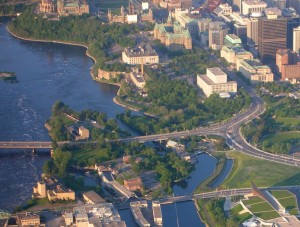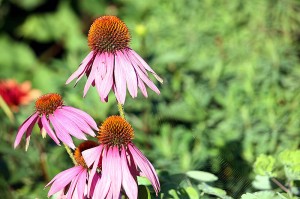Looking for flowers that “scrub” toxic land
Many gardeners are well-acquainted with echinacea – or coneflower – which grows well from Texas to Ontario and most states in between.
The most common color is purple, though it comes in white, yellow or even green too. Purple coneflower much-loved as a hardy perennial that needs little care, can handle drought and is excellent for attracting bees and butterflies.
In herbal circles, echinacea has a longstanding reputation of doing all sorts of helpful things, including reducing the incidence or severity of common colds. Mind you, some scientific studies appear to support those medicinal claims, while others do not. (This post takes no position on that question.)

Victoria island (bottom) in the Ottawa River, connected by bridge to City of Ottawa near Parliament hill (top). Wikipedia image by Shanta Rohse
Now comes word that studies taking place in Ottawa are trying to see if echinacea can help clean contaminated land. As reported by Tom Spears, University of Ottawa biologists Christiane Charet and Jules Blais have been working since last summer with test plots on Victoria Island, a small Ottawa site that collected a lot of hydrocarbons and other pollutants from long use as a factory and rail area.
According to the Ottawa Citizen article the cleaning action consists of a tag-team event that takes place below the soil and above:
The research looks at how natural soil fungus helps plant roots to absorb a class of contaminants called polyaromatic hydrocarbons, or PAHs. Plants often draw on underground fungus to help them absorb nutrients. The work is funded by the Canada Foundation for Innovation.
“What we’re finding is that they (fungi) makes the hydrocarbons much more bioavailable,” Blais explained. In other words, it makes the pollutants easier for the plants to take in.
“We’re not entirely sure how they do this.
“We’re testing now to see to what extent the plants can metabolize and break down these (chemicals),” he said.
“We’re in the very early stages but it does appear quite promising.”
In this case, tough, pretty, low-maintenance echinacea got the nod for the plant part of that experiment. Which is great, because there’s a real need to de-contaminate polluted land. And all the better if the cleaning is based on natural, sustainable processes.
Tags: canada, Christiane Charet, echinacea, environment, Jules Blais, Ontario, pollution, science, University of Ottawa








